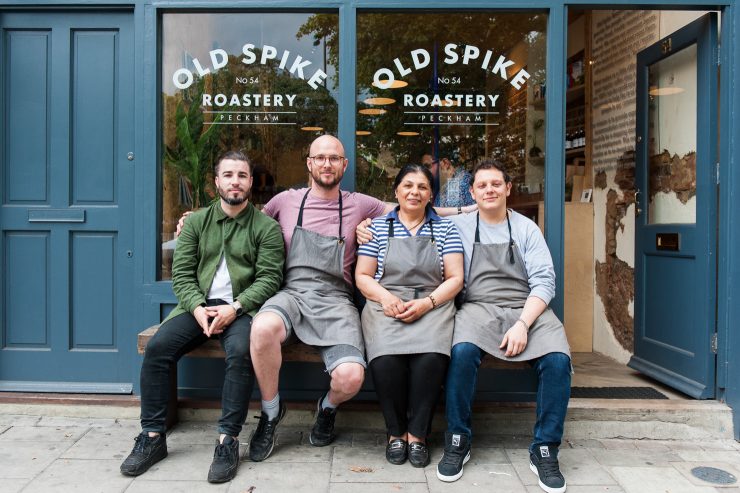
It’s an overcast Sunday afternoon in Peckham. On a busy road at the end of Peckham Rye, cars, double decker buses, and even a horse-drawn cart clatter past in an ebbing and flowing pattern of loud and quiet. Down a row of buildings, amongst the off-licenses, groceries, chicken shops, and shisha bars, the sound of a coffee grinder whirs to life and spills out of the open door of Old Spike Roastery and Cafe onto the sidewalk.
From outside, Old Spike Roastery and Cafe seems a bit misplaced. The glass front, offering a view into the tiny space inside and its contents—minimal furnishings, a curated selection of magazines, Crosstown doughnuts, shelves lined with V60s and filters, all indicating the type of shop that might be found in East London—looks a bit incongruous with the older, shabbier styles of buildings that surround it. Inside, Lucy Floriana quietly sets about making an order of coffees for customers who have just walked in. Floriana is a woman of many smiles and few words. But through her measured movements—making each coffee and heartfelt grins when delivering it—she manages to convey more hospitality than many other baristas do with their upbeat customer banter.
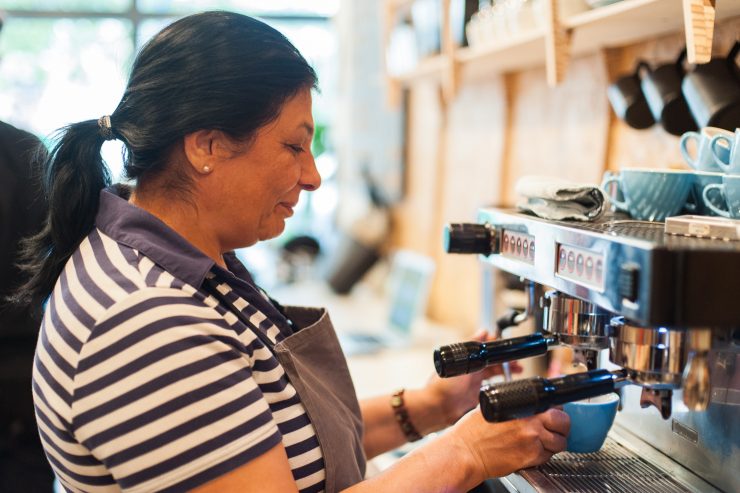
Both Floriana and Old Spike are not what they would at first seem. Where Old Spike might seem like just another specialty coffee shop in a city already bursting with them, it has a higher purpose beyond giving people that dose of caffeination that helps them start their day. Floriana might seem like your usual barista, if a bit shy; but she has faced adversity that many of us can only imagine. Until a few months ago, she was homeless, until Old Spike hired her in a bid to help her turn her life around.
Old Spike isn’t the first social enterprise in London revolving around coffee: Can Do Coffee and its carts around London have been providing jobs for disadvantaged people for a few years now; Paper & Cup, a non-profit cafe in Shoreditch run by Spitalfields Crypt Trust, employs those who are recovering from addiction.
But like many great ideas whose time has come, what was once a few drops has turned into a wave. We Walk The Line, Second Shot, and Old Spike are all social enterprises revolving around coffee that have received a lot of attention recently. It is interesting, then, to find out that Cemal Ezel, the business mind behind and one of the founders of Old Spike, very nearly didn’t open a coffee shop, but a teahouse instead.
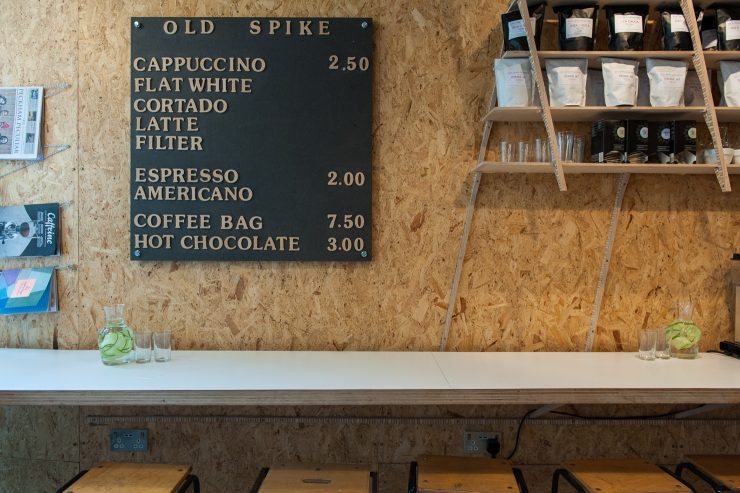
As his story goes, the idea for his business struck him when he was traveling in Vietnam a little over two years ago. In Hoi An, he came upon a well-known local teahouse which was run and staffed entirely by deaf and mute people. Inside the teahouse was an oasis of calm and quiet in the middle of the bustling city, as all who entered chose not to speak out of respect for their hosts. The deaf and mute people, who found that society had trouble making room for them to work in, banded together and created their own space on their own terms, to help others like them.
It was these intersecting ideas of empowerment and social enterprise that inspired Ezel to pursue an idea that eventually evolved into the Old Spike Roastery and Cafe.
“The concept of doing good and doing business at the same time… it felt purposeful,” he said.
Ezel’s particular business model, which is focused on being a comprehensive support network for the homeless that they hire, is timely in the UK. Much attention is being paid to the rapidly increasing rate of homelessness (many blame the current climate of austerity politics for exacerbating the problem), and cities’ often callous treatment of homeless people (such as installing spikes in doorways to discourage rough sleeping) makes headlines often. Though Ezel knew there were already a number of businesses and enterprises helping the homeless, he knew the crisis was only getting worse, and wanted to apply his business knowledge and experience to see how he could help. For employees of Old Spike, help comes in many forms that create what he hopes is a “full-life intervention” rather than a piecemeal solution: they are provided with a house, a bank account, occupational support, clinical psychology support, and more.
With this basis for his social enterprise in place, all Ezel needed was to choose the form it would take—a teahouse, or something else? “When I left the teahouse in Hoi An that day, I had the idea to open a silent teahouse in Clapham. But I don’t really like tea, and I definitely don’t like Clapham,” Ezel says with a laugh. His business partner, Richard Robinson, steered the fledgling company in the direction of coffee, recalling his time in New York and the many cafes/micro-roasteries to be found there.
From this point, Rob Dunne of DunneFrankowski was brought on board to help them create a cafe that would genuinely be high quality, in its service, design, and coffee, and sustainable as a business. “We wanted people to buy the coffee for the coffee,” Ezel explains, “not just as a form of charity. We want people to keep coming back for quality.”
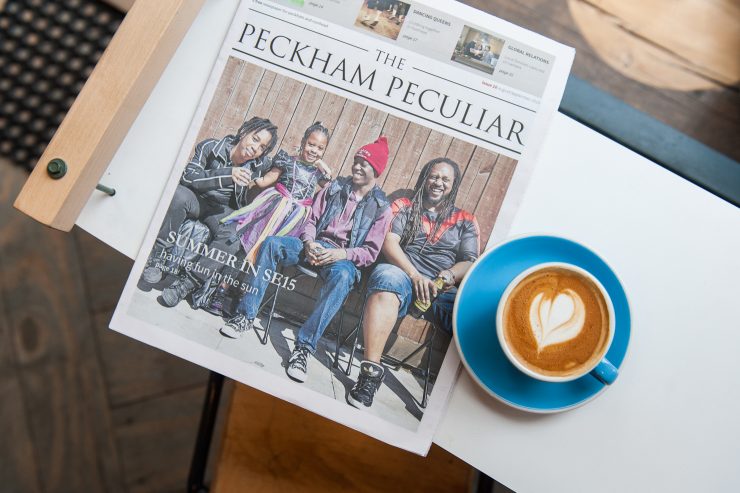
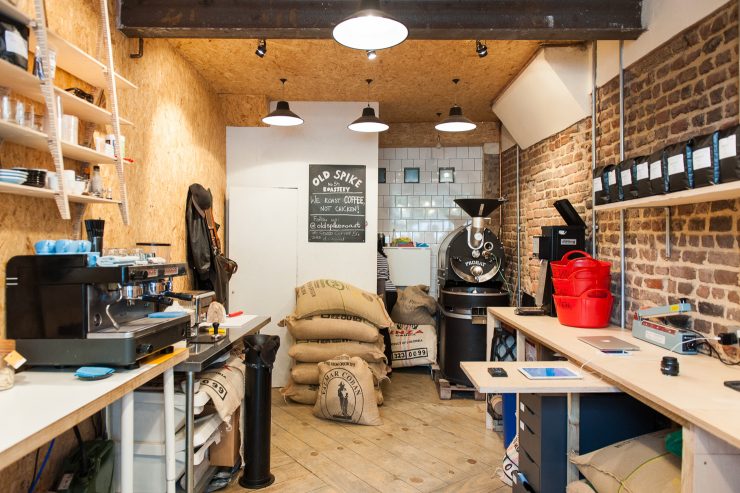
If this had been Ezel’s only goal, then you would definitely be able to say he has achieved it. Since its opening earlier this year, Old Spike has kept up a steady trade on Saturdays and Sundays, building up its own group of regulars—the lifeblood of any local cafe. It recently moved to being open seven days a week. The coffee, roasted in-house on the diminutive Probat in the corner, is delicious, and clearly keeps people coming back. Floriana is thriving in her role as a barista—becoming less shy each day—and is an exemplary case of what Old Spike has the potential to do. For most cafe owners, this would be success. But Ezel is dreaming bigger—much, much bigger—than that.
Starting in September, the plans for expansion will get underway. From the launch of the first two coffee vans in September, to six more in November, to a projected 28 next year, it is hoped that Change Please (the name of Old Spike’s fleet of coffee vans) will employ two to three people per van. With an eventual goal of 60 vans throughout London, that is potentially a lot of people that Ezel’s business is helping get back on their feet. He also hopes to expand the production side of Old Spike, moving into roasting for wholesale and subscription, a move that would allow him to employ many more people at the roastery. As for the support they provide, such as housing, Ezel even hopes that investment will allow him to buy housing to provide to employees, rather than relying on local landlords to work with the program. There’s even already talk—and investor interest—in getting the business across the pond, to help out disadvantaged and homeless people in New York. And from there, it could go any number of places, to help people wherever there is a great need.
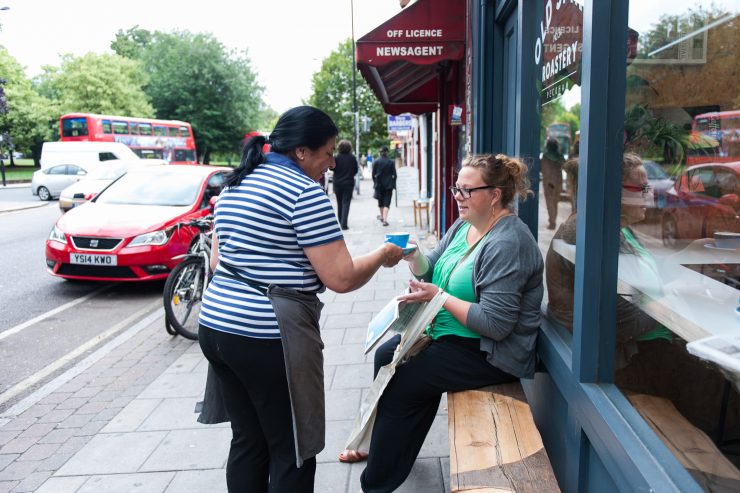
But for now, Old Spike is but a humble cafe in Peckham.
“This cafe was the pilot, to show people what we can do so that we could raise the funding to expand,” Ezel explains.
Ezel’s plans are ambitious in the extreme. He presents them with such a quiet confidence and certainty that the seemingly impossible appears to become reachable. The list of companies looking to collaborate and invest in this project is impressive to say the least; on standby are some of the UK’s biggest media outlets to promote the project and get the ball rolling come September. It’s easy to get swept up in the big business talk and grand ideas, but the heart of this issue is, and was always, the potential human impact it has.
After taking group photos, I sit on the bench outside to finish my coffee, where Floriana joins me for a little break. In short, hesitant sentences, she tells me about her shop in Romania, where she sold fruit, and locals would come in for coffee. What she missed the most about having a shop like that was the communication. In London, being homeless, she felt invisible and alone as people passed her every day, not speaking to her. The simple fact of having a job where she could communicate with and serve people again made her much happier.
It is Ezel’s hope that every Old Spike employee has the potential to find this kind of happiness, borne of the basic comforts and securities we all take for granted. In his words, that would truly be good coffee doing good.
Old Spike Roastery is located at 54 Peckham Rye, London. Visit their official website, and follow them on Facebook, Twitter, and Instagram.
Kate Beard is a Sprudge staff writer based in London. Read more Kate Beard on Sprudge.
The post London: Coffee Doing Good At Old Spike Peckham appeared first on Sprudge.

